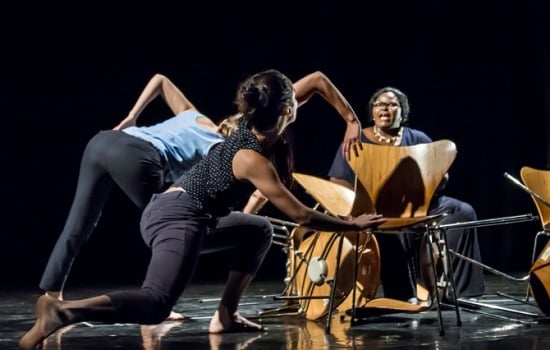
The study aims to test proven arts therapies on a larger scale to see whether they can be adopted nationally
Photo: Stroke Odysseys/Pari Naderi
£2m study into ‘scaling up’ arts and health interventions
A research team of artists, scientists and clinicians will investigate “the impact and scalability of arts interventions” on the physical and mental health of more than 800 patients.
A major study into the effectiveness of music and dance therapy has been launched, to explore the feasibility of embedding these interventions in mainstream clinical care.
More than 800 patients will be recruited via the NHS to participate in “proven” arts and health programmes at three London hospitals – King’s College, Guy’s and St Thomas’ – community centres across Lambeth and Southwark, and at the South London and Maudsley NHS Foundation Trusts.
‘Scaling up Health Arts Programmes: Implementation and Effectiveness Research’ (SHAPER) is funded by a £2m grant from the Wellcome Foundation. King’s College London, which is co-leading the project with University College London (UCL) , claims it is the largest ever of its kind.
Senior Vice President and Health Provost Sir Robert Lechler said the programme includes a stream of work dedicated to examining how arts interventions might be implemented within the NHS, “delivering better results for patients and possible cost savings”.
SHAPER co-lead Professor Carmine Pariante said there is growing research about the effectiveness of arts interventions in healthcare.
“But more work is needed to take the programmes from successful local projects with short-term funding to national programmes commissioned by the health sector.”
The treatments
SHAPER will involve three arts intervention programmes: ‘Melodies for Mums’, a singing group aimed at reducing the symptoms of postnatal depression, ‘Dance for Parkinson’s’, run by the English National Ballet, and ‘Stroke Odysseys’, which will offer cross-artform rehabilitative therapy to improve stroke patients’ cognition, mobility and speech.
Pariante’s co-lead in the research, UCL Associate Professor Dr Daisy Fancourt, said two years’ clinical research into the health impacts of singing programmes has shown promise in improving mothers’ mental health and, by extension, their children’s early development. Plans for Breathe Arts Health Research to offer this treatment to up to 400 mothers – and monitor their oxycontin and cortisol levels – “will allow us to further test the intervention to reach more mothers who could benefit”, Fancourt said.
Weekly ballet classes led by specialist dancers and musicians will be trialled at King’s College Hospital for about 135 patients. ‘Dance for Parkinson’s’, established in 2010, has been proven to benefit participants’ mental health. Research to date has suggested the programme may also relieve some physical symptoms of the disease and “help participants feel that their condition interferes less with aspects of daily life”.
The third treatment, delivered by arts charity Rosetta Life, will be tested at scale for the first time with up to 300 patients.
Parliamentary support
In a blog post, Pariante said the research was inspired in part by a “call to arms” in a 2017 inquiry report by the All-Party Parliamentary Group on Arts Health and Wellbeing.
The paper recommended, among other actions, that Secretaries of State for Culture, Media and Sport, Health, Education and Communities and Local Government develop a strategy to deliver health and wellbeing through the arts. It also called for NHS provider trusts and local authorities to “incorporate arts on prescription into their commissioning plans and to redesign care pathways where appropriate”.
While there is growing enthusiasm for arts-based interventions, Fancourt told ArtsProfessional that the three-year programme will be run like a drug trial; randomly controlled, peer reviewed, and scientifically robust.
She said that many of the researchers “are coming into this not as advocates but genuinely really interested” in the effectiveness of these methods compared to traditional healthcare.
“It’s a little different from a lot of the studies in arts and health where they’re asking ‘can it work’ because we’ve chosen interventions that we known can work.
“Now we’re asking, ‘can they work in practice?’”
Join the Discussion
You must be logged in to post a comment.